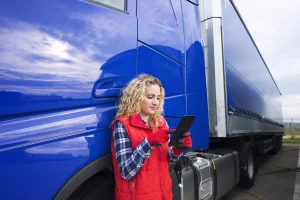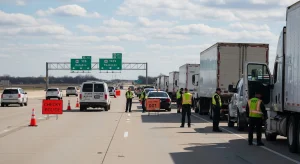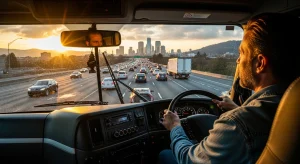Texas continues to lead in the adoption of advanced transportation technologies
Texas could be one of the first states to witness the future of road transportation. Austin-based Kodiak Robotics is perfecting the deployment of fully autonomous trucks, operating without the supervision of a safety driver. The innovative company employs technology that promises to transform both the supply chain and the lives of truck drivers.
Autonomous trucks are not a novelty, as Kodiak Robotics is currently testing them, although it still employs safety drivers to oversee the vehicles during their journey. By the end of 2024, the company plans to start operating autonomous trucks without anyone at the wheel, marking a significant advancement in transportation automation. Given its headquarters is in Texas, this state might be the first to see the advent of completely autonomous trucks.
Dan Goff, Kodiak’s head of policy, believes that autonomous vehicles can address supply chain issues and improve the lives of truck drivers. However, John Esparza, president and CEO of the Texas Trucking Association, asserts that the industry has no intention of replacing human drivers but aims to enhance safety and efficiency on the roads, according to Community Impact.

Transition to autonomous vehicles: what changes are being made?
The growing demand and challenges in the transportation industry have led to increased insurance rates and operational costs. A report from the American Transportation Research Institute revealed a historic increase in the marginal cost per hour for carriers in 2023. However, autonomous transportation is expected to reduce total transportation costs by 30% by 2040, according to PwC.
To support this transition, the Texas Department of Transportation and Cavnue are upgrading a 21-mile stretch of SH 130 with new technology to assist autonomous trucks. This effort is part of a broader trend, as 25 states in the U.S. have enacted laws for autonomous vehicles, and another 12 allow testing, according to the Insurance Institute for Highway Safety.
Texas has been a fertile ground for autonomous vehicle innovation, with companies like Zoox and Mars Auto also conducting tests in the state. Autonomous trucking companies are required to report any accidents to the National Highway Traffic Safety Administration, with recent data showing that autonomous trucks exhibit more predictable driving patterns compared to cars.
State legislation, such as Senate Bill 2205, has facilitated the adoption of these technologies by prohibiting cities from regulating autonomous vehicles. Esparza emphasizes that this technology could increase freight transportation efficiency, although autonomous trucks are not subject to the same driving hour limitations as human drivers.
Thus, Texas continues to lead in the adoption of advanced transportation technologies, preparing for a new era where autonomous trucks could become a common sight on the state’s roads.

What are Grabovoi numbers and what can be manifested with them
Grabovoi numbers: a list of numerical sequences intended to activate certain areas of daily life in order to enhance, improve, and develop them. Manifestation and

CVSA’s 2026 international inspection to target ELD manipulation
The 2026 inspection will focus on drivers who falsify or manipulate their electronic logging devices (ELDs) to alter their hours of service. Each year, the

Illinois CDL Audit: 20% Under Federal Review
A federal audit found that nearly 20% of Illinois’ non-domiciled CDLs may not comply with federal standards. The state has 30 days to correct the issues or risk losing $128 million in highway funding.

Wall Street under the microscope: solid employment, contained inflation, and rising volatility
Employment, inflation, and retail sales set the tone for a week marked by volatility and sector rotation on Wall Street. In the latest episode of

Predictive Logistics 2026: AI Stops Bottlenecks Before They Start
Predictive AI in transportation is no longer experimental — it is operational. In 2026, intelligent logistics systems anticipate demand spikes, optimize inventory levels, and redesign routes in real time, eliminating supply chain disruptions before they occur.

Best and Worst States to Be a Truck Driver in the United States in 2026
A new national ranking reveals the best and worst states to be a truck driver in the United States in 2026, measuring truck driver salaries, fatal crashes, congestion and road conditions.
